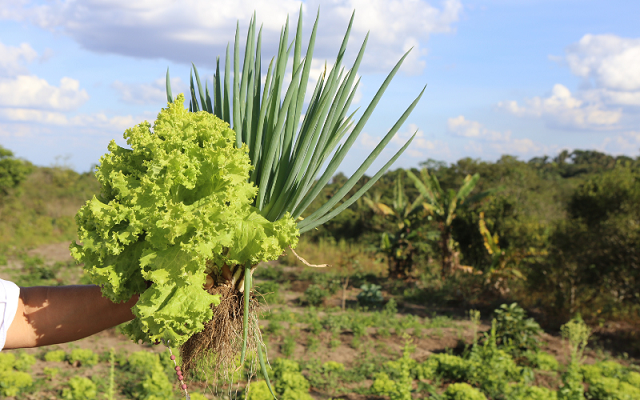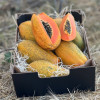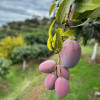Permaculture and Agroecology
Sustainable agriculture is an ecological response to the polluting agricultural practices in our modern industrialized society, where intensive agriculture has replaced traditional agricultural practices established on small units that generated little or no pollution on land and water after World War II.
Eric, the founder of Biovie, is an agronomist by training and has been working with this sustainable approach for 30 years now. This is why permaculture and agroecology are at the heart of our concerns at Biovie. Historically, two approaches have emerged in recent decades, mainly in reaction to traditional agricultural methods: permaculture and agroecology. Permaculture focuses on the creation of small self-sufficient systems using the interdependent relationships that already exist on the farm. In permaculture, a lot of consideration is given to the agricultural history of the land and the geography of the plots, among other things, to optimize routes within the farm and to think about an intelligent crop rotation. Permaculture is often a custom, non-reproducible approach. Agroecology, on the other hand, uses a more rational and global scientific agricultural approach that can serve as a replicable and exportable model to other farms. It is often applied to larger farms than permaculture.
Both approaches share the common goal of designing sustainable food systems that are beneficial for human health by preserving the quality and life in soils and water, while remaining productive and economically viable. In summary, the overall idea is to design sustainable agricultural systems that produce food while preserving biodiversity and reducing negative environmental impacts.
What are the differences between permaculture and agroecology?
Although permaculture and agroecology both aim to create agricultural systems that preserve the health of soils, water, and living beings, there are some notable differences between the two:
- Approach: Permaculture is primarily a design approach that uses ethical and ecological principles to create sustainable systems of modest size. Agroecology, on the other hand, is a scientific discipline that uses a rigorous methodology to study agricultural systems.
- Scale: Permaculture can be applied to systems ranging from a family garden to a small farm and will optimize the internal functioning of the farm. Agroecology can be used on a much larger scale, covering entire agricultural regions.
- Techniques: Permaculture encourages the use of techniques such as crop rotation, integrated pest management, companion planting, agroforestry, and biodiversity restoration, and considers the optimization of energy devoted to transportation. Agroecology also addresses these techniques but focuses on larger-scale issues such as food security, sustainable production systems, and also includes social justice and fair trade in production systems where the distance between producer and consumer can be significant.
What is permaculture?
Permaculture is a sustainable design approach that aims to create self-sufficient and environmentally friendly systems using ethical and ecological principles.
The fundamental principles of permaculture are based on biodiversity, intelligent and rational management of natural resources in time and space, closed cycles of energy and material production within farms. Permaculture observes nature and draws inspiration from existing natural ecosystems to replicate them on a small scale.
What is agroecology?
Agroecology is an approach that focuses on the complex relationships between environmental, economic, and social factors that influence agricultural production. It uses an interdisciplinary approach to understand how agricultural systems can be designed and managed in a sustainable and ecological manner. Agroecology aims to create sustainable food systems by using methods that respect the environment, natural resources, and biodiversity. It applies to large-scale food production, small farm systems, home gardens, and local communities. The food systems are sustainable, equitable, and durable.
We personally ensure that our suppliers are engaged in one or the other approach. When they are organic producers (coconuts, spirulina, papayas, tiger nuts, avocados...), we visit them and inspect their facilities to ensure their commitment ourselves. For processed organic products, larger organic supply chains, or wild product harvesters (seed cooperative, wrap production, Klamath harvest, birch sap or fresh algae harvest), we collaborate with our suppliers to reflect on their working methods.

What are the philosophical differences?
There are some philosophical differences between permaculture and agroecology:
- Permaculture:
- Based on ethical principles such as cooperation rather than competition, sustainable resource management, personal responsibility, and the search for long-term sustainable solutions.
- Focuses on designing sustainable and self-sufficient systems using techniques such as crop rotation, integrated pest management, and companion planting.
- Agroecology:
- A scientific discipline that focuses on understanding agricultural systems using an ecosystem approach.
- Includes issues such as food security, social justice in food systems, and the long-term sustainability of production systems.
- Uses a variety of techniques to achieve these goals, such as cover crops, intercropping, crop rotation, and integrated pest management.
When to use permaculture or agroecology?
Permaculture:
- Suitable for small-scale food production
- Useful for the rapid ecological restoration of soils affected by intensive techniques, for setting up family gardens, small farms, or community agricultural systems
- Particularly relevant for small producers and farmers who are developing or starting out
- For sustainable food production with few resources, in emerging countries in tropical zones, for example
While agroecology:
- Suitable for large-scale food production
- Useful for scientific research on long-term agricultural systems
- Allows for the training of farmers, territorial planning, and public agricultural policy
- Particularly used by governments and public or semi-public organizations
- A future path for developing large-scale sustainable food systems
In summary, permaculture and agroecology are sustainable approaches in agriculture that focus on ecological food production. Permaculture emphasizes interdependent relationships and the design of autonomous systems, while agroecology uses a scientific approach to understand complex interactions. Regardless of the approaches, agroecology and permaculture are two techniques that are part of Biovie's founding values.







